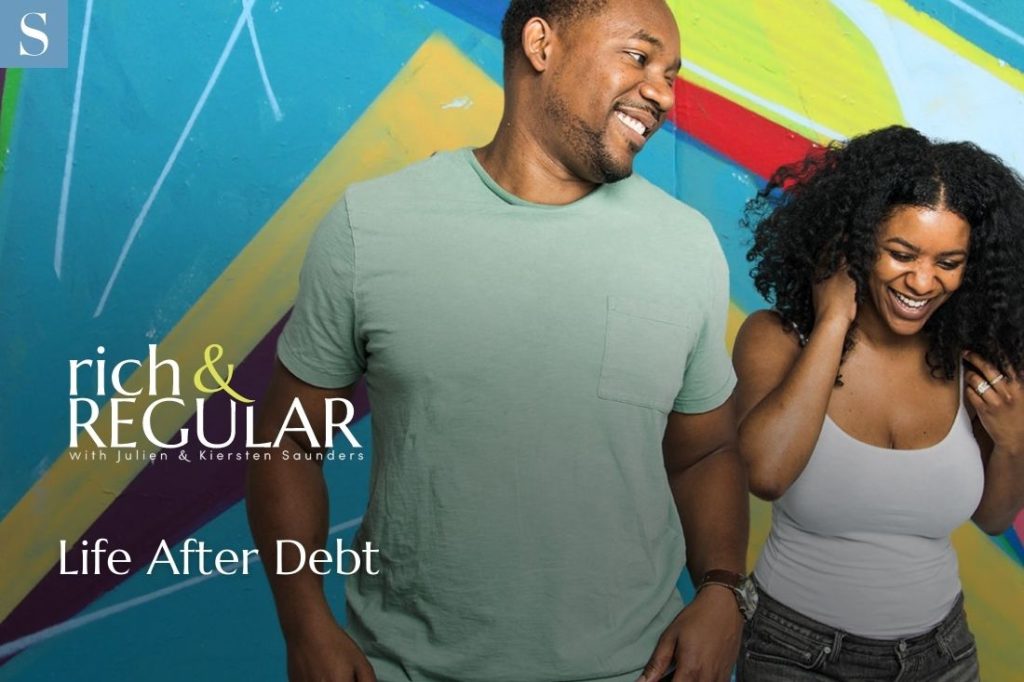Congratulations! You’ve paid off your debt and have some extra cash in your account. You know you must make it work for you instead of someone else, but you’re not quite sure what your priorities should be. Having a plan in place ahead of time can make the transition to a debt-free life easier and help you put your money to work immediately.
Even if you’re not quite at the end of your debt-paying journey, developing a plan for what to do with your future funds can motivate you to stay the course. Having a plan in place now, before the final payment, can allow you to get your money to work immediately, with no gap between the last payment to a company and the first payment to yourself.
Rich & REGULAR with Kiersten and Julien Saunders is no longer releasing new episodes on the SUCCESS Podcast Network, but you can still listen to the full conversation below.

Take care of yourself first
Once you’ve made the last payment on your debt, having some kind of celebration is a good idea. You might treat yourself to a dinner out, a new gadget or an adventure that you denied yourself while working on your debt as an acknowledgment of the work you put in. While celebrating is worthwhile, knowing where your money will go after that final payment is withdrawn is essential.
Without a good plan for what used to be your debt payment, you run the risk of lifestyle inflation and spending all of that money before it has a chance to help you make your future better. Instead of waiting until the money is sitting around to be spent, review your budget for categories that might need improvement, like your emergency fund, retirement savings and other ways to better your life.
Take stock
Start your plan by assessing where you stand now. You’re out of debt or have significantly reduced your debt, which is excellent, but did you neglect other areas of your financial life in the process?
Before you think about all the fun things you’re going to do, ensure you have the following in place to see you through any financial ups and downs:
A robust emergency fund
Although the size of your emergency fund is a personal decision based on your lifestyle, monthly costs and income, most financial planners recommend that you have three to six months set aside—and possibly more than that if you can swing it. Especially during times of economic uncertainty and rising prices, having a good cushion can help you deal with issues without going back into debt.
Well-funded retirement accounts
Although it may not make financial sense to max out all your retirement accounts, you should have a rough idea of what you’ll need to spend in retirement and ensure your savings are on track to take care of you later in life. Make sure you’re contributing enough to get the full extent of any employer matches, and work with a financial advisor to help you determine the best place to put extra cash to prepare for your future.
Determine your goals
After ensuring your immediate needs and future financial goals are on track, spend a little time thinking about where you want to be in five or 10 years. We’ve discussed how goal setting can help improve your financial life, and knowing where you’re headed is the fastest way to reach your destination.
Spend some time with your journal and talk to your partner, if applicable, about what you want the future to look like. If saving for your child’s college education is a priority (and you’ve made sure your retirement plan is on track), consider opening or increasing contributions to an investment account set aside for your child’s future.
We’re a fan of brokerage accounts for investing since they allow you to pivot as your needs change. You can decide to have one account set aside expressly for your child’s education, but you can also have a fund for a new car, an epic trip or another long-term financial goal.
Have some fun
Once you have your goals set and your needs covered, you can experience the freedom that comes from being debt-free. If you’ve always wanted a personal trainer or to work on an expensive sport or hobby, you now have room to try these things without feeling guilty.
This is also a great time to start looking into passive income sources. Not only do you have the funds available to do a little careful experimentation, but you can afford to spend the time now, when you’re younger, to work out the income streams that will support you and your family best.
You don’t have to invest in real estate or go into a business venture. Peer-to-peer lending through an established platform, supporting a small local business (after doing your homework) or pooling money with an investment group to make a bigger impact than you could as an individual contributor can all help you explore what investing style works for you. Make sure you research and understand what you’re getting into before signing anything or writing a check.
You may even find that you enjoy experimenting with different types of investment accounts and seeing what they have to offer. For example, bonds, dividend stocks, ETFs and index funds are all investment types with both benefits and drawbacks. Without debt, you have the freedom to put a little bit into each type and see what works for you.
Final thoughts
Much like a debt payoff plan can help you tackle debt and make progress, having an after-debt plan can help ensure you’re putting your money to good use and making it work for you.
Without debt, you can expand and enrich your life, and can do so with the knowledge that you have taken care of yourself and your family while also having room to experiment and indulge in your passions guilt-free.










